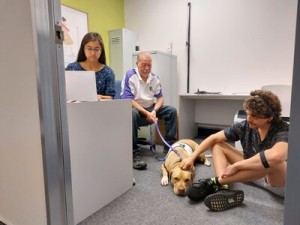New Research to Examine Changes to Heart and Brain Following Interactions with Therapy Dogs
 The Human Animal Bond Research Institute (HABRI) today announced a new grant for research to examine the effects of therapy dog interactions on heart and brain activity. This grant was awarded to a team of researchers at the University of Wollongong, led by Jillian Teo, PhD Candidate in Clinical Psychology at the University of Wollongong, along with Professor Stuart Johnstone at the School of Psychology and Professor Susan Thomas at the Graduate School of Medicine.
The Human Animal Bond Research Institute (HABRI) today announced a new grant for research to examine the effects of therapy dog interactions on heart and brain activity. This grant was awarded to a team of researchers at the University of Wollongong, led by Jillian Teo, PhD Candidate in Clinical Psychology at the University of Wollongong, along with Professor Stuart Johnstone at the School of Psychology and Professor Susan Thomas at the Graduate School of Medicine.
This study will investigate the changes in heart and brain activity occurring in university students during interactions with therapy dogs and aims to better understand the mechanisms behind the benefits of human-dog interactions on human health and wellbeing. In addition to measurements of heart and brain activity, researchers will also collect self-report measures of emotional states and psychological distress from students. The study hypothesizes that therapy dog interactions will lead to greater relaxation compared to standard relaxation methods, potentially informing future interventions and policies to optimize student health.
“Our preliminary study indicates that therapy dogs can favorably influence multiple human health-related pathways, including the autonomic and central nervous systems, likely through reductions in stress and increases in relaxation,” said Jillian Teo, the Principal Investigator for this project. “This new study will yield insights into the mechanisms underlying these benefits for human health and facilitate the development of evidence-based practices to optimize future animal-assisted interventions for improved health and wellbeing.”
This study will adopt a repeated measures design to examine psychophysiological outcomes from 100 university students. It will combine subjective self-report measures with objective physiological measurements, including heart rate, heart rate variability and an electroencephalogram (EEG). The study will further add to the existing literature by providing a more complete understanding of the psychophysiological changes in humans and related health benefits resulting from human-dog interactions.
“Therapy dogs offer an accessible public health strategy for college and university students and for many populations experiencing stress and other challenges to their mental health,” said Steve Feldman, HABRI President. “HABRI is proud to support this study, which will use rigorous science to guide health interventions for students and all who could benefit from interactions with therapy dogs.”
Photo provided by the University of Wollongong.
Short URL: http://caninechronicle.com/?p=320452
Comments are closed












